Ahmad Rashid rose to prominence after the Marxist-leninist insurgency in Baluchistan. He was part of the marxist nucleus which was fighting in Baluchistan. Another young man in this group was Najam Sethi who along with Tariq Ali are considered first of the “New Left” in Pakistan. Those who introduced Trotsky’s writings for the first time in Pakistani Left wing (which was hard core Stalinist and Maoist in those days). Both Rashid and Sethi soon quit being revolutionaries and emerged as seasoned political commentators and analysts operating in the “Post-marxist” paradigm. Amongst them Rashid is more academic, his work on Taliban and United States policy towards Afghanistan and central Asia is considered authoritative. He is perhaps the most objective analyst on Afghanistan and Pakistan. In the following article he puts Salman Taseer and Shahbaz Bhatti’s murders in perspective . While its fundamental to criticize the role of military establishment the abject surrender by Zardari regime should never be underestimated. Its the vacum being left by the weaker “political establishment” which is being filled in by the proto-fascist elements. This sense of proportion is lacking in most progressive analysis coming from Pakistan but Ahmad Rashid’s highly analytical mind superbly achieves this balance. This is without any question one of best writing on recent crisis of Islamic Republic.
Shaheryar Ali
Ahmad Rashid : New York Review of Books Blog (With Thanks)
The assassination on Wednesday of Shahbaz Bhatti, Pakistan’s Federal Minister of Minorities, killed in broad daylight in Islamabad by four gunmen, is one of the most shameful acts of political violence committed by Pakistani extremists. That it comes just two months after the murder of Salman Taseer, the Governor of Punjab and one of the country’s leading liberal voices makes it all the more chilling. Yet the government and state’s reaction to the two killings has been even more shameful—raising the disturbing possibility that extremism is still being used by the security services in its efforts to oppose Western policies in the region.
The 40-year-old Bhatti was a Roman Catholic and the only Christian member of the cabinet of Prime Minister Yousf Reza Gailani. It was a death foretold. Taseer had been assassinated for his courageous struggle to amend Pakistan’s blasphemy law, which has been used to persecute minorities—a struggle to which Bhatti had also dedicated himself. Bhatti made a videotape some months ago that he wanted released to the BBC if he was killed. In it he said he would carry on the campaign to amend the blasphemy law.
“I will prefer to die for the cause [of defending] the rights of my community rather than to compromise on my principles,” Bhatti said in the tape. “The forces of violence, militants, banned organizations, Taliban and al-Qaeda, want to impose their radical philosophy in Pakistan and whosoever stands against it, they threaten him.”
 Bhatti knew his life was in danger; he had been threatened repeatedly in recent weeks and had asked the government to provide him with security and a bulletproof vehicle. But even after Taseer’s murder, the government did nothing. Like Taseer, he ended up riddled with machine gun fire—though it is unclear whether a security detail might have helped, since Taseer was shot dead by his own bodyguard, a highly trained police officer. In both cases, the killers have come from a culture that has grown increasingly intolerant in recent years, abounds in conspiracy theories, and wrongly interprets Islam solely in terms of jihad and violence.
Bhatti knew his life was in danger; he had been threatened repeatedly in recent weeks and had asked the government to provide him with security and a bulletproof vehicle. But even after Taseer’s murder, the government did nothing. Like Taseer, he ended up riddled with machine gun fire—though it is unclear whether a security detail might have helped, since Taseer was shot dead by his own bodyguard, a highly trained police officer. In both cases, the killers have come from a culture that has grown increasingly intolerant in recent years, abounds in conspiracy theories, and wrongly interprets Islam solely in terms of jihad and violence.
As leaders worldwide—from the Pope to Hillary Clinton to Nicolas Sarkozy—strongly condemn Bhatti’s murder, the reaction of the Pakistani government has been vapid. No action has been taken or promises made to curb the freedom of violent extremist groups, who have hailed both murders and who have meanwhile been staging daily street demonstrations in Lahore to demand the death sentence for Raymond Davis, the American CIA agent who is now in Pakistani custody after killing two Pakistani men believed to be agents for the army’s Inter-Services Intelligence (ISI). (Davis was part of a secret team working in the country; the exposure of his activities puts further strain on the uneasy alliance between the US and Pakistan.)
For its part, the army has so far failed to express regret about either Bhatti’s murder or Taseer’s. The army chief General Ashfaq Kayani declined to publicly condemn Taseer’s death or even to issue a public condolence to his family. He told Western ambassadors in January in Islamabad that there were too many soldiers in the ranks who sympathize with the killer, and showed them a scrapbook of photographs of Taseer’s killer being hailed as a hero by fellow police officers. Any public statement, he hinted, could endanger the army’s unity.
Behind this silence lies something more sinister. For decades the army and the ISI have controlled the extremist groups, arming and training them in exchange for their continuing to serve as proxy forces in 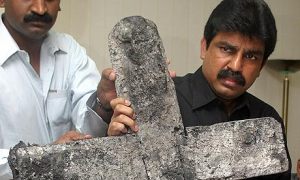 Afghanistan and Kashmir. But in recent years, the army has lost control of them and they are striking targets of their own. Yet the army has refused to help crack down on its rogue protégés—despite the fact that extremists have increasingly attacked the army and the ISI itself, and at least 2,000 military personnel have died at their hands in the past five years. This is all the more ominous in view of the resources the military commands: half a million men, another half a million reserves, 110 nuclear weapons (according to US media estimates) and one of the largest intelligence agencies in the world, the ISI, which has an estimated 100,000 employees.
Afghanistan and Kashmir. But in recent years, the army has lost control of them and they are striking targets of their own. Yet the army has refused to help crack down on its rogue protégés—despite the fact that extremists have increasingly attacked the army and the ISI itself, and at least 2,000 military personnel have died at their hands in the past five years. This is all the more ominous in view of the resources the military commands: half a million men, another half a million reserves, 110 nuclear weapons (according to US media estimates) and one of the largest intelligence agencies in the world, the ISI, which has an estimated 100,000 employees.
If the army has now surrendered any willingness to take on the extremists, the political establishment had already given up long ago. Prime Minister Gailani and President Asif Ali Zardari head the Pakistan People’s Party, the largest national party in the country—some would say the only national party left. Zardari, as the husband of slain leader Benazir Bhutto, is no stranger to extremism himself, and his populist base has traditionally voted for the party’s anti-mullah, anti-army and pro-people policies. Unfortunately those principles were abandoned by a series of corrupt and ineffectual leaders, and the PPP today is not even a shadow of what it once was.
Zardari has backtracked on foreign policy goals such as improving relations with India and Afghanistan, as well as on domestic efforts to curb the power of the extremists and impose new taxes—on almost everything that may have helped Pakistan move towards becoming a modern state. There is no doubt that the army has tried to thwart the civilian leaders at almost every turn—but rather than resist or resign, the politicians have just been brow beaten into compliance and abject submission.
As a result, there is a vicious double game playing out in the streets, fueling the tensions that resulted in Bhatti’s death. The security agencies have unleashed Lashkar-e-Taiba (LT)—the largest and most feared extremist group in Pakistan, which was behind the 2008 Mumbai attacks—on to the streets of Lahore. The group has been banned by the US, Britain and the United Nations and supposedly by Pakistan too. LT stalwarts have been demonstrating daily outside the US consulate to ensure that Raymond Davis—who was apparently charged with monitoring their activities—hangs. By giving free reign to such banned groups the security agencies may have inadvertently signaled to all extremist groups, including the sectarian groups who hate Christians, that they are free to take the law into their own hands. What is behind this complex and mind-boggling strategy? It is all part of a wider cat and mouse escalation between the US and the Pakistani military. The army wants to control any future peace talks that the US may have with the Taliban, so that the army’s aims for a future pro-Pakistan Afghan government in Kabul are met. Its leaders also want to make doubly sure that any long-term American arrangements do not leave Pakistan’s rival India in a stronger position in Afghanistan.
So far the US seems unmoved; and it has already circumvented the ISI to start indirect peace talks with some Taliban. One consequence is that the military are allowing extremist groups considered anathema to the US on the streets. This is also why Davis is not being freed, and why US-Pakistan relations are at their worst in many years. In the meantime, the army and the government continue to receive about $3 billion a year in US military and economic aid.
On March 3, Senator Bob Corker, who recently visited Islamabad, told the Senate Foreign Relations Committee that he found Pakistan “the most disheartening place in the world to be, where you are talking the type of relationship that we have.” He added, “I think that in many ways we get played like a piece of music” by the Pakistanis.
The ISI may well be playing the Americans, but it does so at the cost of steadily ceding ground to the extremists. Right now Pakistan is becoming a place where there is an army without a country.
Source: http://www.nybooks.com/blogs/nyrblog/2011/mar/04/army-without-country/
 Today is the third day of censorship being imposed on the BBC in Pakistan BBC news goes on air throughout Pakistan via a series of privately owned FM networks. With the explosion of private TV channels in Pakistan, the standards of journalism have a suffered a great deal. An ideological media fuelled by militant Islamism and Pakistani nationalism is on an ideological crusade in Pakistan whose first victim has been “objective reporting”.
Today is the third day of censorship being imposed on the BBC in Pakistan BBC news goes on air throughout Pakistan via a series of privately owned FM networks. With the explosion of private TV channels in Pakistan, the standards of journalism have a suffered a great deal. An ideological media fuelled by militant Islamism and Pakistani nationalism is on an ideological crusade in Pakistan whose first victim has been “objective reporting”. news again and again. Most of it is objectively incorrect. Most of this media has been fiercely loyal to the policies of Pakistan’s ruling oligarchy. It may take sides on different issues which represent the interests of different factions of oligarchy depending on the Right wing and Pakistani Nationalist dominated press’s opinion of whose “patriot” and whose not but when it comes to broad general interest of the oligarchy inform of the ideological boundaries of state, the media is wholly partisan without any significant exception. The mania against India, denial on state involvement in nuclear proliferation and Islamic fascism, denial of existence of anti colonial struggles like those in Balochistan and Pakistani occupied Kashmir [written and Azad Kashmir or Free Kashmir in all Pakistani media] are to quote few examples where all Pakistani media has exactly same opinion to express, the opinion of Pakistani ruling elite and its state institution
news again and again. Most of it is objectively incorrect. Most of this media has been fiercely loyal to the policies of Pakistan’s ruling oligarchy. It may take sides on different issues which represent the interests of different factions of oligarchy depending on the Right wing and Pakistani Nationalist dominated press’s opinion of whose “patriot” and whose not but when it comes to broad general interest of the oligarchy inform of the ideological boundaries of state, the media is wholly partisan without any significant exception. The mania against India, denial on state involvement in nuclear proliferation and Islamic fascism, denial of existence of anti colonial struggles like those in Balochistan and Pakistani occupied Kashmir [written and Azad Kashmir or Free Kashmir in all Pakistani media] are to quote few examples where all Pakistani media has exactly same opinion to express, the opinion of Pakistani ruling elite and its state institution Pakistani authorities always had a problem with the BBC. From the day BBC had collaborated with the local FM radios to increase its coverage in Pakistan; it is being opposed by Pakistani authorities in one way or another. There is usual bureaucratic red tape which always comes in handy when Pakistan wants to censor the BBC. This contract is incomplete and this rule has been violated bla bla bla. The real reason is that Pakistani authorities are fearful of objective reporting. Being a Lefti I am no fan of BBC, but unfortunately the standards of journalism have been deteriorated to such an extant in Pakistan that BBC appears to be the most objective news source in Pakistan. That’s a pity but that’s a fact!
Pakistani authorities always had a problem with the BBC. From the day BBC had collaborated with the local FM radios to increase its coverage in Pakistan; it is being opposed by Pakistani authorities in one way or another. There is usual bureaucratic red tape which always comes in handy when Pakistan wants to censor the BBC. This contract is incomplete and this rule has been violated bla bla bla. The real reason is that Pakistani authorities are fearful of objective reporting. Being a Lefti I am no fan of BBC, but unfortunately the standards of journalism have been deteriorated to such an extant in Pakistan that BBC appears to be the most objective news source in Pakistan. That’s a pity but that’s a fact!
 A study of discourse emerging from ruling elite of Pakistan, the PML and colonial administration which they inherited from Colonial administration suggest an obsession with monism themes as opposed to pluralism. Jinnah’s slogan of “Unity, Faith and Discipline” itself speaks of need to “unify and control”. The slogan relates more to ideologies of totalitarian regimes of Stalinist Russia and Nazi Germany than to the Liberal tradition of Western Europe to which Jinnah is said to be trained in. Ethnic identities became the “others” of Muslim identity and as a result an existential threat the new state. The question of national rights was diverted by Jinnah’s stern warning against the “evil of provincialism”, the need to construct a “unified culture” so strong that a man as modern as Jinnah who took up the case of muslim socio-cultural rights in India, stood in Dacca and thundered “Urdu Urdu and only Urdu!” a language which was not the language of even 0.2% of Pakistanis at the time Those who demanded an equal status of Bengali along side Urdu were to called traitors and communists. After Jinnah’s death things became worse and PML which lacked any popular base in East and West Pakistan joined hands with Clerics and Islamic Fundamentalists whom Jinnah thoroughly despised. Jinnah’s handpicked Prime Minister Nawabzada Khan Liaqat Ali Khan, a member of feudal aristocracy passed the Objectives Resolution and state acquired an ideological character.
A study of discourse emerging from ruling elite of Pakistan, the PML and colonial administration which they inherited from Colonial administration suggest an obsession with monism themes as opposed to pluralism. Jinnah’s slogan of “Unity, Faith and Discipline” itself speaks of need to “unify and control”. The slogan relates more to ideologies of totalitarian regimes of Stalinist Russia and Nazi Germany than to the Liberal tradition of Western Europe to which Jinnah is said to be trained in. Ethnic identities became the “others” of Muslim identity and as a result an existential threat the new state. The question of national rights was diverted by Jinnah’s stern warning against the “evil of provincialism”, the need to construct a “unified culture” so strong that a man as modern as Jinnah who took up the case of muslim socio-cultural rights in India, stood in Dacca and thundered “Urdu Urdu and only Urdu!” a language which was not the language of even 0.2% of Pakistanis at the time Those who demanded an equal status of Bengali along side Urdu were to called traitors and communists. After Jinnah’s death things became worse and PML which lacked any popular base in East and West Pakistan joined hands with Clerics and Islamic Fundamentalists whom Jinnah thoroughly despised. Jinnah’s handpicked Prime Minister Nawabzada Khan Liaqat Ali Khan, a member of feudal aristocracy passed the Objectives Resolution and state acquired an ideological character.










 A call for Wheel Jam strike was given by Balochistan National Party [M] and Baloch National Front. According to BBC the wheel jam strike was a success. Surprising development which took place that Pashtun base Islamic fundamentalist Party of Molana Fazul-ur-Rehman supported the call of wheel jam strike. This party is considered traditional ally of establishment in Balochistan. What was disturbing that Pashtun Nationalist Party PKMAP of Mehmood Khan Achackzai which were part of NAP and traditional allies of Baloch nationalists were no where to be seen.
A call for Wheel Jam strike was given by Balochistan National Party [M] and Baloch National Front. According to BBC the wheel jam strike was a success. Surprising development which took place that Pashtun base Islamic fundamentalist Party of Molana Fazul-ur-Rehman supported the call of wheel jam strike. This party is considered traditional ally of establishment in Balochistan. What was disturbing that Pashtun Nationalist Party PKMAP of Mehmood Khan Achackzai which were part of NAP and traditional allies of Baloch nationalists were no where to be seen.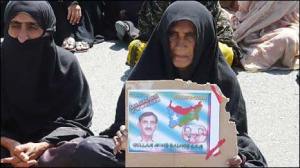
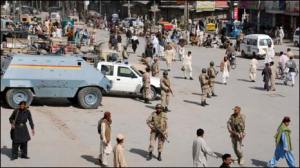
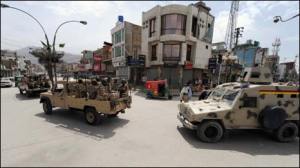
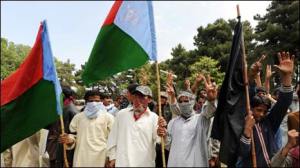 Killing of witnesses threatens the possibility of any justice regarding the large numbers of persons who have disappeared in Pakistan. These recent killings seem to indicate the mobilisation of secret units in order to eliminate those who have knowledge about the maintenance of secret prisons and torture chambers in the country. Particularly those who have taken a keen interest in pursuing justice relating to these matters have been made targets of these killings. It is likely that these killings will be followed by similar actions to others. The knowledge about these murders will also discourage victims and witnesses who want to narrate the human rights abuses they have suffered and to seek justice. The deadening silence imposed in such circumstances will obstruct all attempts to return to a normal situation of rule of law. Now with the intervention of the Supreme Court under the Chief Justice, Iftekhar Choudhry who has been reinstated by popular intervention. On the other hand the terror tactics adopted in this way will act to the advantage of the extremist elements who resort to terrorism
Killing of witnesses threatens the possibility of any justice regarding the large numbers of persons who have disappeared in Pakistan. These recent killings seem to indicate the mobilisation of secret units in order to eliminate those who have knowledge about the maintenance of secret prisons and torture chambers in the country. Particularly those who have taken a keen interest in pursuing justice relating to these matters have been made targets of these killings. It is likely that these killings will be followed by similar actions to others. The knowledge about these murders will also discourage victims and witnesses who want to narrate the human rights abuses they have suffered and to seek justice. The deadening silence imposed in such circumstances will obstruct all attempts to return to a normal situation of rule of law. Now with the intervention of the Supreme Court under the Chief Justice, Iftekhar Choudhry who has been reinstated by popular intervention. On the other hand the terror tactics adopted in this way will act to the advantage of the extremist elements who resort to terrorism











